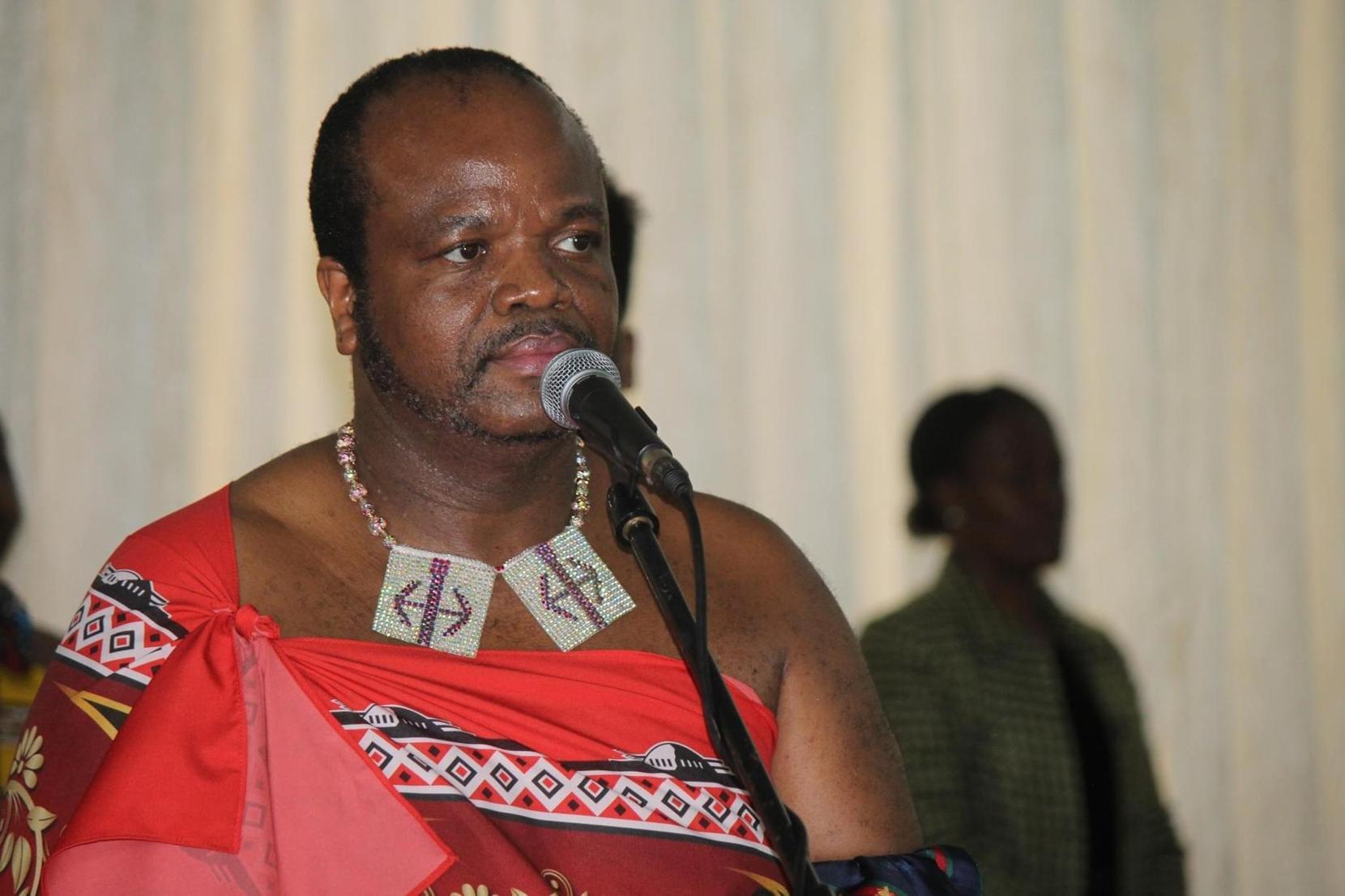Africa-Press – Eswatini. The Eswatini National Provident Fund’s (ENPF) future-focused conversion into a national pension scheme is not a sudden move, but a fulfillment of King Sobhuza II’s original vision for Lidlelantfongeni in 1974.
The shift from a provident fund, which provides a once-off lump-sum payout, to a pension fund that offers a lifelong monthly income, aligns with international best practice and the standards set by the International Labour Organisation (ILO).
This change is designed to protect members from outliving their savings. A sustainable, lifelong income ensures that after decades of work, emaSwati can retire with dignity and financial security for the remainder of their lives.
His Majesty King Mswati III with ENPF CEO Futhi Tembe and former CEO and now Minister Prince Lonkhokhela
The Foundation of a Royal Legacy
Back then, King Sobhuza planted the seed for this vision with E100, 000 of government capital, an amount equivalent to roughly E6.4 million today. The King envisioned a system that would provide workers with a steady, inflation-adjusted income for life, protecting them in retirement, in the event of incapacity, or securing their dependents after death.
King Sobhuza captured this sentiment in a national address, stating: “Our duty is to ensure the welfare of all workers and citizens. That is why we are establishing Lidlelantfongeni. It will guarantee that every worker and their family receives a reliable, lifelong income, allowing them to live with dignity and a good quality of life after their working days are over.” He further described the fund as “our commitment to a new way of life for all emaSwati… a commitment to their lifelong security.”
The late King Sobhuza. He established the ENPF 50 years ago.
King Sobhuza set the principle in stone – no liSwati should retire to poverty or lose dignity after a lifetime of work. Tsine sikhule sati kutsi umuntfu makayo shinga bekaphatsa sikhwama. Noma bamupha sibhuluja, uyadla yidla bese sowufaka kulesikhwanyana lasiphetse. Yini sona lesikhwama? Kuyasho kutsi lidlelantfongeni. Utsi makafika ekhaya kubantfwana uyasho kutsi asewungiphe nali lidlelantfongeni lami. Sewuyalitfola licatsa. Seniyasikelana seniyaphila. Bese bayadla nebantfwana loko lakuphetse labuye nako.
Bese bayaphila. Lidlelantfongeni ngulapho siphephela khona ngetikhatsi letimatima. Lidlelantfongeni ngulapho uphephela khona – We grew up with a tradition of sharing. If you were offered food, you would partake and save the rest for your family.
A cake fit for a jubilee celbration
This is the spirit of Lidlelantfongeni – saving for rainy days. It is a tradition of putting something aside for your loved ones, a practice of securing a future for those who matter most. That is the very foundation of what we are establishing here. It is a way for all emaSwati to save for their future and to care for their families.
Ngatsi mangifuna libito kutsi ngitawu yetsa ngitsini lentfo ngeligama lelitawuvakala kancono emaSwatini. Ngacabanga kutsi ngitsi Phephela Khona ngakhandza kutsi awu mase uvusa boMbandzeni ngete balati leligama lelitse Phephela Khona. Ngase ngibuka ligama labatalati boMbandzeni, ngabona kutsi labatalati Lidlelantfongeni. Ngatsi ke cha…litaba Lidlelantfongeni. Namuhla ngiyalibusisa ngitsi Lidlelantfongeni – While considering a name for this Fund, I wanted something that would be easily understood by all emaSwati, from past to future generations. I considered Phephela Khona, which means a provision in times of need. However, I was concerned that our ancestors, like King Mbandzeni, might not grasp its meaning. So, I settled on a word they would know and that has a deep, shared meaning that captures the very essence of our purpose -Lidlelantfongeni.
The King with at the 50th celebration of the ENPF
A Promise to the People
In those early days, the economy was small and formal employment was fragile, meaning the Fund’s contributions were too modest to support a fully-fledged national pension. As a result, many retirees ended up financially exposed.
The once-off payouts lacked resilience against inflation, and workplace injuries could swiftly lead to destitution. Despite these challenges, the blueprint was drawn. King Sobhuza’s principle was clear: no liSwati should retire into poverty or lose dignity after a lifetime of work.
Royal Endorsement and Fulfilled Vision
Today, His Majesty King Mswati III supports this forward-looking vision. At the ENPF’s Golden Jubilee celebrations in July 2025, he publicly endorsed the strategic shift, linking the Fund’s future to its storied past. Invoking his predecessor’s words, His Majesty stated: “Lidlelantfongeni was founded by King Sobhuza as more than a financial entity but a beacon of stability and prosperity for the Kingdom of Eswatini.” His Majesty then articulated his own vision, declaring the conversion crucial to the nation’s social contract.
“No worker in our kingdom must be left behind. We must secure a better future for all through ENPF.” Addressing the shortcomings of the existing model, he said: “Lump sum payments, though sizeable at the time, often leave our pensioners vulnerable when the money is exhausted. This is not the future we want for our people.” His Majesty emphasised that the conversion would create a “sustainable system where retirees enjoy long-term security, lifting many out of poverty in their later years.” He described the conversion as “not just necessary, it is inevitable.”
Institutional Readiness and Public Support
The ENPF, under the future-focused leadership of CEO Futhi Tembe, is walking in King Sobhuza’s footsteps. The conversion is underpinned by actuarial soundness and institutional readiness, with Cabinet having already approved the principle of the shift.
ENPF CEO Futhi Tembe
Tembe stresses the importance of extending formal retirement schemes to the 59% of Eswatini’s workers in the informal sector. She also highlights the deeply personal nature of the conversion: “We are shifting from simply paying out benefits to actively protecting our members’ futures.”
This is not a bureaucratic change, but the elegant fulfillment of a royal promise made half a century ago. It is a legacy in motion, with all the right ingredients to succeed.
Voices of a Legacy: From Sobhuza’s Dream to Today’s Reality
For many in the public, the conversion is not a bureaucratic change but the fulfillment of a promise made generations ago.
Journalist Mphikeleli Msibi
Their personal stories highlight the real-world impact of the reform. Entrepreneur Machawe Mnisi lauded His Majesty King Mswati III for his proactive role in the fund’s evolution, saying that the Monarch has not merely accepted a legacy, but has actively fortified it.
“By providing his unequivocal support for the conversion, King Mswati III is securing a prosperous future for generations of emaSwati. This underscores a powerful message that the nation’s leadership is not just focused on the present, but is building a lasting foundation for tomorrow.”
Entrepreneur Khanyisile
Bongiwe Mhlanga, a former civil servant and now an informal trader advocates for a hybrid pension payout mode. She says 40% as a lump sum and 60% as a lifelong monthly pension.
“This approach would allow retirees to invest while providing steady income for living expenses,” Mhlanga said. Her perspective is shaped by her relative, who worked over 35 years but lost his lump sum to bills, leading to years of anxiety. She believes this change can help her generation avoid a similar fate.
Machawe Mnidi
Mphikeleli Msibi, a seasoned journalist, emphasised the importance of a stable income in retirement, warning that a one-time lump sum can lead to financial instability. Msibi stated, “A monthly pension secures daily essentials and preserves independence, dignity, and peace of mind.”
Entrepreneur Khanyisile strongly supports the shift to a monthly pension model, which she believes provides lasting financial security. She advocates for lifelong monthly allocations that also benefit a surviving spouse. Khanyisile states that this reform is a fulfillment of King Sobhuza’s original vision for working people to retire without fear.Bongiwe Mhlanga
She says that today’s leadership is finishing what the King started, ensuring ongoing support for Emaswati and securing the fund’s compassionate legacy for future generations.
swazibridge
For More News And Analysis About Eswatini Follow Africa-Press







